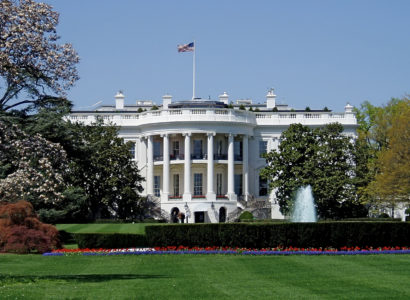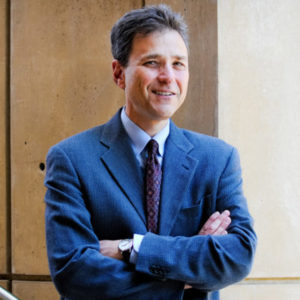Stanford’s David Sklansky on Two IG Firings, One with Oversight of Covid-19 Relief Bill

Within the space of just a few days, President Trump has fired two Inspectors General with important oversight roles. One was assigned to oversee the massive $2 trillion COVID-19 aid package. The other was the Intelligence Community Inspector General, who determined last year that the whistleblower complaint in the Ukraine scandal was “credible” and should be forwarded to Congress. Here, Stanford Law Professor David Sklansky discusses the role of the inspector general and the firings.
Let’s start with the relief funds watchdog, Glenn A. Fine. Can you explain who he is and how he came to have oversight of the $2 trillion package?
When Congress passed the coronavirus aid package toward the end of last month, it called for the creation of a “Pandemic Response Accountability Committee” to monitor the handling of the aid and safeguard against waste, fraud, mismanagement, and abuse. The committee is comprised of Inspectors General from a range of agencies that will play roles in the relief effort. Congress directed that the chair of the new committee should be appointed by the chair of the Council of Inspectors General on Integrity and Efficiency, which is an office Congress created in 1978 to improve and coordinate the work of Inspectors General throughout the Executive Branch. The Council’s current chair is Michael Horowitz, the Inspector General for the Department of Justice. On March 30, Horowitz appointed Glenn Fine to chair the new Pandemic Response Accountability Committee. Fine joined the Department of Defense as Principal Deputy Inspector General in June 2015, and since 2016 he had been running the office, first as Acting Inspector General and then–when that appointment expired and no new Acting Inspector General was named—as “Principal Deputy Inspector General Performing the Duties of the Inspector General.”

What are the key responsibilities of the chairman of the Pandemic Response Accountability Committee? Who would Fine report to?
The committee will be responsible for auditing and investigating the implementation of the entire $2 trillion dollars of coronavirus relief. The statute passed by Congress and signed by the President requires the committee to report to the President, to Congress, and to the American public.
Do we know why Fine was chosen to chair the Pandemic Response Accountability Committee?
When the chair of the Council of Inspectors General, Michael Horowitz, named Fine last month to lead the Pandemic Response Accountability Committee, he said that Fine was “uniquely qualified” for the job, “given his more than 15 years of experience as an Inspector General overseeing large organizations.” Before coming to the Defense Department, Fine was the Inspector General at the Department of Justice for eleven years, serving under President Bill Clinton, President George W. Bush, and President Barack Obama. The federal government now has more than seventy Inspectors General—the number has steadily increased since the original twelve Inspectors General were appointed in 1978. But Horowitz was on solid ground in calling Fine unique. There’s no Inspector General with more high-level experience than Fine, or with a stronger reputation for independence and integrity.
Did Congress make independent oversight part of the deal for the emergency relief package?
Yes, Congress did make independent oversight part of the deal. That’s what the Pandemic Response Accountability Committee is for. The law authorizing the coronavirus relief also calls for the appointment of a new Special Inspector General for Pandemic Recovery to monitor how the Treasury Department carries out its duties under the law. And the law creates a Congressional Oversight Commission that will operate within the Legislative rather than the Executive Branch.
Why is Fine now out as the head of the Pandemic Response Accountability Committee?
Like the other members of that committee, the chair of the committee is required by law to be an Inspector General.
On Monday, April 6, the President appointed a new Acting Attorney General for the Department of Defense: Sean O’Donnell, who Trump appointed last fall as Inspector General of the Environmental Protection Agency, and who will continue to serve in the role as well. That meant that Fine was no longer serving as the effective Inspector General for the Department of Defense, and that meant he could no longer serve on the Pandemic Responsibility Accountability Committee, let alone as its chair.
I see. So the President displaced Fine from his primary role, which in effect removed him from the accountability committee. Does the President has the authority to do that?
The President does have the authority to substitute a new Acting Inspector General for Fine, although there is a long tradition of treating Inspectors General as nonpartisan and respecting their independence.
Did the President say why he was removing Fine?
Not really. He suggested to reporters that it was because Fine was a holdover from the Obama Administration, although he also said that he didn’t know Fine and didn’t believe he had ever met him. For the time being Fine will continue in his role as Principal Deputy Inspector General.
Moving to Michael Atkinson, the Inspector General of the Intelligence Community who was appointed by Trump in 2018 and fired on Friday, April 3, what were his key responsibilities?
His job was to monitor the activities of the intelligence agencies—conducting audits, investigations, and reviews to detect waste, fraud, or mismanagement. Among his responsibilities was to receive and review whistleblower complaints.
Can you remind us of the events leading up to the whistleblower complaint that made its way to Atkinson?
Last August Atkinson received a whistleblower complaint alleging that President Trump was pressuring the government of Ukraine for political favors in exchange for military assistance. Atkinson concluded the complaint was credible and raised a matter of “urgent concern,” a finding which under statute required that the complaint be forwarded to Congress. The Trump Administration resisted sending the complaint to Congress. Last September, Atkinson informed congressional leaders of the existence of the complaint, but not its content, copying his direct superior, the Acting Director of National Intelligence, Joseph Maguire. Soon thereafter the White House released a summary of President Trump’s July telephone call with President Volodymyr Zelensky of Ukraine—the call in which Trump asked Zelensky to “do us a favor” and investigate former Vice President Joseph Biden and his son.
What reason was given for firing Atkinson?
President Trump made clear that the handling of the whistleblower complaint was the reason for Atkinson’s dismissal. When asked why Atkinson was dismissed, the President said this: “He took a whistleblower report, which turned out to be a fake report — it was fake. It was totally wrong. It was about my conversation with the president of Ukraine. He took a fake report and he brought it to Congress, with an emergency. Okay? Not a big Trump fan — that, I can tell you.”
Does Congress have any power to challenge these firings?
It can question them, but it can’t reverse them. Under the law the President has to inform Congress of his grounds for removing Atkinson, and then wait thirty days before making the removal effective. Trump got around the waiting requirement by placing Atkinson on administrative leave. His written notification to Congress said only that he no longer had confidence in Atkinson. Congress of course can hold oversight hearings about the dismissals, just as it can for any Executive Branch action.
How about the new, Special Inspector General for Pandemic Recovery in the Treasury Department? Who will that be?
President Trump has said he intends to nominate Brian Miller for that position. Miller served for nine years as Inspector General of the General Services Administration, but he currently works in the Office of the White House Counsel, where he was involved in defending President Trump against the impeachment charges that arose from his dealings with Ukraine. That appointment will require Senate confirmation.
One thing that may come up in Miller’s confirmation hearings—beyond how independent he can and will be from the President—is the statutory requirement that the Special Inspector General, like the Pandemic Response Accountability Committee, make certain reports to Congress. When signing the coronavirus relief statute, President Trump issued a statement saying that he believed that requirement was an unconstitutional violation of separation of powers.
Is the President replacing any other Inspectors General?
Stay tuned. On the same day that he removed Fine, the President complained on Twitter about the Acting Inspector General of the Department of Health and Human Services, Christi Grimm, who recently reported that hospitals around the country lack sufficient tests and protective equipment for combatting the coronavirus. Trump called Grimm’s report “Another Fake Dossier,” and he noted she “spent 8 years with the Obama Administration.” Grimm has worked at the Office of Inspector General at HHS since 1999; she served under Presidents Clinton and Bush as well as under President Obama and then President Trump.
David Alan Sklansky is the Stanley Morrison Professor of Law and Faculty Co-Directory of the Stanford Criminal Justice Center. He is the author of Democracy and the Police (Stanford University Press 2008), and he writes regularly about criminal procedure and law enforcement.
